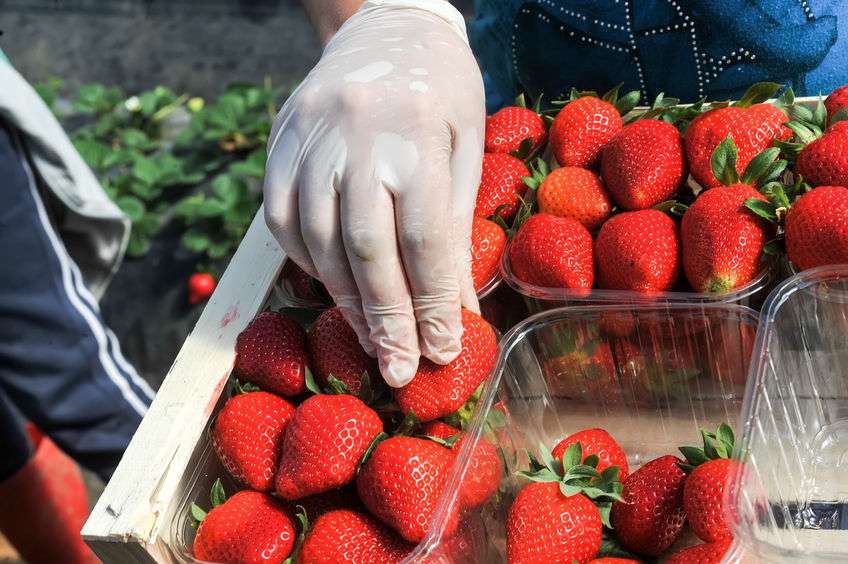
The National Farmers Union has voiced its fears about a possible shortage of workers following the leak of a Home Office document revealing post-Brexit plans to deter immigrants from the European Union.
British farming and the wider food industry have come to rely on EU labourers to work in the fields and factories.
Securing access to this workforce has been one of the NFU's priorities since the UK voted to withdraw from the European Union in the 2016 referendum.
But a document leaked to The Guardian suggests that the Home Office intends to drive down the number of low skilled migrants from the EU.
"To be considered valuable to the country as a whole, immigration should benefit not just the migrants themselves but also make existing residents better off,” says the draft document.
Following the leak, NFU deputy president Minette Batters called for an urgent commitment from Government that British agriculture will have the workers its needs following withdrawal from the EU.
The loss of the migrant workforce from the European Union could have serious consequences for the food industry, she said.
“A competent and reliable workforce is vital for British farms. Farming produces the raw ingredients for the UK food and drink sector, worth £109 billion and employing 3.8 million people," she told FarmingUK.
“Across all sectors, particularly in horticulture, poultry, pig and dairy, access to both seasonal and permanent workers is absolutely critical for the nation to continue producing food to feed the British public.
“An abrupt reduction in the number of EU workers able to work in the UK after we leave the EU would cause massive disruption to the entire food supply chain - a solution for the whole industry is needed to ensure the sector has access to the skills and labour it needs.”
'Urgent commitment'
The NFU is calling is thus for an "urgent and clear" commitment from Government to ensure that farmers and growers have access to sufficient numbers of permanent and seasonal workers post-Brexit.
Ms Matters continued: “And we need clarity on the new rules for EU nationals living and working in the UK well before free movement ends in March 2019. The NFU is urging the Migration Advisory Committee to report before Christmas on the impact on agriculture specifically.
“The NFU believes it is critical that the Government consults extensively with the food and farming industry on this issue and proceeds with an immigration policy that is based on fact and business need.
“It is critical that any policy recognises the importance and seasonality of both low and highly skilled workers to our food production system, especially in a time of record low levels of unemployment.”
'Hostile environment'
The Guardian says that the leaked document suggests that post-Brexit Britain may seek to extend Theresa May's "hostile environment" policy to EU nationals, alongside migrants from countries outside the European Union.
In 2012, as Home Secretary, she said: “The aim is to create here in Britain a really hostile environment for illegal migration," as she sought to fulfil the Conservative Party's commitment to reduce net immigration to tens of thousands each year.
The leaked Home Office document emphasises the need to reduce migration once the UK leaves the European Union.
"Sharply increased levels of net migration since 1997, from both the EU and beyond, have given rise to public concern about pressure on public services and wages," it says.
"These concerns about the sustainability of unrestricted migration from the EU featured strongly in the debate surrounding the referendum on the UK's membership of the EU on 23 June, 2016. The public must have confidence in our ability to control immigration from the EU.
"Although net migration from the EU has fallen over the last year, we cannot exercise control over it at present, as free movement gives EU citizens a right to reside in the UK regardless of the economic needs of this country.
"The Government has, therefore, made clear that, after our departure, we will end free movement in its current form."
Salary threshold
The document outlines possible measures to reduce the level of low-skilled migration. One suggestion is the introduction of a salary threshold below which migrant workers would not be able to work in the UK.
It suggests "limiting the number of EU citizens able to come to the UK to undertake low-skilled work, for example through a salary threshold, an assessment of the skill-level of the occupation and/or through a direct numeric cap on numbers.
"Restrictions could be combined with the option of a scheme for temporary or seasonal workers depending on the industry."
Another is the adoption of a policy requiring employers to recruit British residents before looking abroad.
The draft suggests that employers may be required to complete an "economic needs" test to check whether suitable recruits can be found locally before they are a able to recruit anyone from the European Union.
'Sustainable levels'
The document says: "We may require EU nationals seeking to reside in the UK, for example for work, to obtain permission to do so before taking up employment or before entering the UK, we may require employers to recruit locally first, or we may restrict access to occupations that are not in shortage, particularly in non-highly skilled occupations.
"In making the rules, we will still be guided by our ambition to achieve sustainable levels of net migration."
The document also suggests reducing the opportunity for workers bring their dependants to the UK, especially at lower skill levels.
A recent survey carried out for the NFU indicated that the number of seasonal workers coming to work on British farms had dropped by 17 per cent since the Brexit vote.
The union has repeatedly called on the Government to ensure that the industry will still have access to migrant labour once the UK leaves the EU in 2019.
